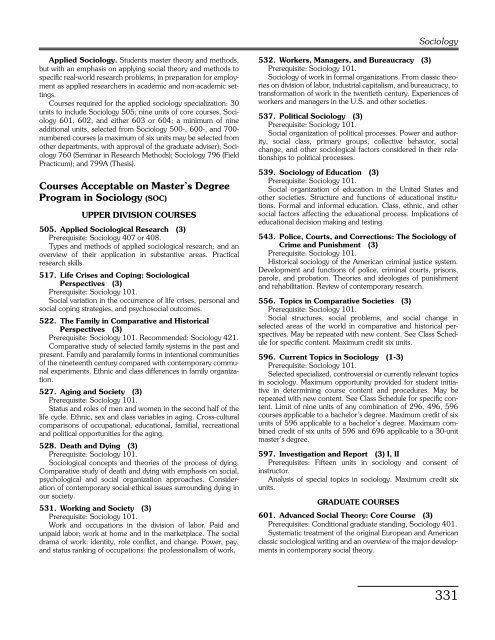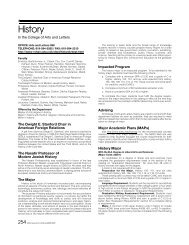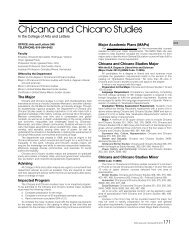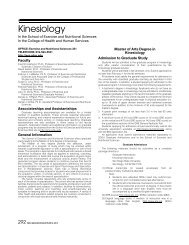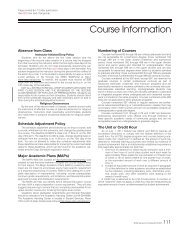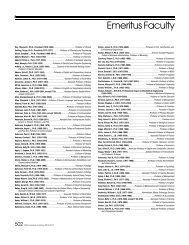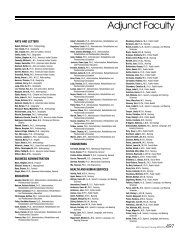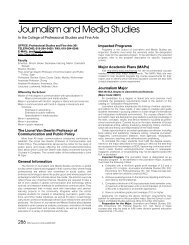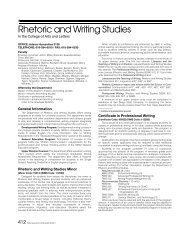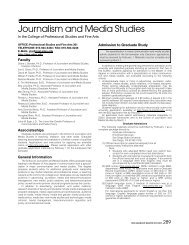President Stephen L. Weber - San Diego State University ...
President Stephen L. Weber - San Diego State University ...
President Stephen L. Weber - San Diego State University ...
Create successful ePaper yourself
Turn your PDF publications into a flip-book with our unique Google optimized e-Paper software.
Applied Sociology. Students master theory and methods,<br />
but with an emphasis on applying social theory and methods to<br />
specific real-world research problems, in preparation for employment<br />
as applied researchers in academic and non-academic settings.<br />
Courses required for the applied sociology specialization: 30<br />
units to include Sociology 505; nine units of core courses, Sociology<br />
601, 602, and either 603 or 604; a minimum of nine<br />
additional units, selected from Sociology 500-, 600-, and 700numbered<br />
courses (a maximum of six units may be selected from<br />
other departments, with approval of the graduate adviser); Sociology<br />
760 (Seminar in Research Methods); Sociology 796 (Field<br />
Practicum); and 799A (Thesis).<br />
Courses Acceptable on Master’s Degree<br />
Program in Sociology (SOC)<br />
UPPER DIVISION COURSES<br />
505. Applied Sociological Research (3)<br />
Prerequisite: Sociology 407 or 408.<br />
Types and methods of applied sociological research; and an<br />
overview of their application in substantive areas. Practical<br />
research skills.<br />
517. Life Crises and Coping: Sociological<br />
Perspectives (3)<br />
Prerequisite: Sociology 101.<br />
Social variation in the occurrence of life crises, personal and<br />
social coping strategies, and psychosocial outcomes.<br />
522. The Family in Comparative and Historical<br />
Perspectives (3)<br />
Prerequisite: Sociology 101. Recommended: Sociology 421.<br />
Comparative study of selected family systems in the past and<br />
present. Family and parafamily forms in intentional communities<br />
of the nineteenth century compared with contemporary communal<br />
experiments. Ethnic and class differences in family organization.<br />
527. Aging and Society (3)<br />
Prerequisite: Sociology 101.<br />
Status and roles of men and women in the second half of the<br />
life cycle. Ethnic, sex and class variables in aging. Cross-cultural<br />
comparisons of occupational, educational, familial, recreational<br />
and political opportunities for the aging.<br />
528. Death and Dying (3)<br />
Prerequisite: Sociology 101.<br />
Sociological concepts and theories of the process of dying.<br />
Comparative study of death and dying with emphasis on social,<br />
psychological and social organization approaches. Consideration<br />
of contemporary social-ethical issues surrounding dying in<br />
our society.<br />
531. Working and Society (3)<br />
Prerequisite: Sociology 101.<br />
Work and occupations in the division of labor. Paid and<br />
unpaid labor; work at home and in the marketplace. The social<br />
drama of work: identity, role conflict, and change. Power, pay,<br />
and status ranking of occupations: the professionalism of work.<br />
Sociology<br />
532. Workers, Managers, and Bureaucracy (3)<br />
Prerequisite: Sociology 101.<br />
Sociology of work in formal organizations. From classic theories<br />
on division of labor, industrial capitalism, and bureaucracy, to<br />
transformation of work in the twentieth century. Experiences of<br />
workers and managers in the U.S. and other societies.<br />
537. Political Sociology (3)<br />
Prerequisite: Sociology 101.<br />
Social organization of political processes. Power and authority,<br />
social class, primary groups, collective behavior, social<br />
change, and other sociological factors considered in their relationships<br />
to political processes.<br />
539. Sociology of Education (3)<br />
Prerequisite: Sociology 101.<br />
Social organization of education in the United <strong>State</strong>s and<br />
other societies. Structure and functions of educational institutions.<br />
Formal and informal education. Class, ethnic, and other<br />
social factors affecting the educational process. Implications of<br />
educational decision making and testing.<br />
543. Police, Courts, and Corrections: The Sociology of<br />
Crime and Punishment (3)<br />
Prerequisite: Sociology 101.<br />
Historical sociology of the American criminal justice system.<br />
Development and functions of police, criminal courts, prisons,<br />
parole, and probation. Theories and ideologies of punishment<br />
and rehabilitation. Review of contemporary research.<br />
556. Topics in Comparative Societies (3)<br />
Prerequisite: Sociology 101.<br />
Social structures, social problems, and social change in<br />
selected areas of the world in comparative and historical perspectives.<br />
May be repeated with new content. See Class Schedule<br />
for specific content. Maximum credit six units.<br />
596. Current Topics in Sociology (1-3)<br />
Prerequisite: Sociology 101.<br />
Selected specialized, controversial or currently relevant topics<br />
in sociology. Maximum opportunity provided for student initiative<br />
in determining course content and procedures. May be<br />
repeated with new content. See Class Schedule for specific content.<br />
Limit of nine units of any combination of 296, 496, 596<br />
courses applicable to a bachelor’s degree. Maximum credit of six<br />
units of 596 applicable to a bachelor’s degree. Maximum combined<br />
credit of six units of 596 and 696 applicable to a 30-unit<br />
master’s degree.<br />
597. Investigation and Report (3) I, II<br />
Prerequisites: Fifteen units in sociology and consent of<br />
instructor.<br />
Analysis of special topics in sociology. Maximum credit six<br />
units.<br />
GRADUATE COURSES<br />
601. Advanced Social Theory: Core Course (3)<br />
Prerequisites: Conditional graduate standing, Sociology 401.<br />
Systematic treatment of the original European and American<br />
classic sociological writing and an overview of the major developments<br />
in contemporary social theory.<br />
331


